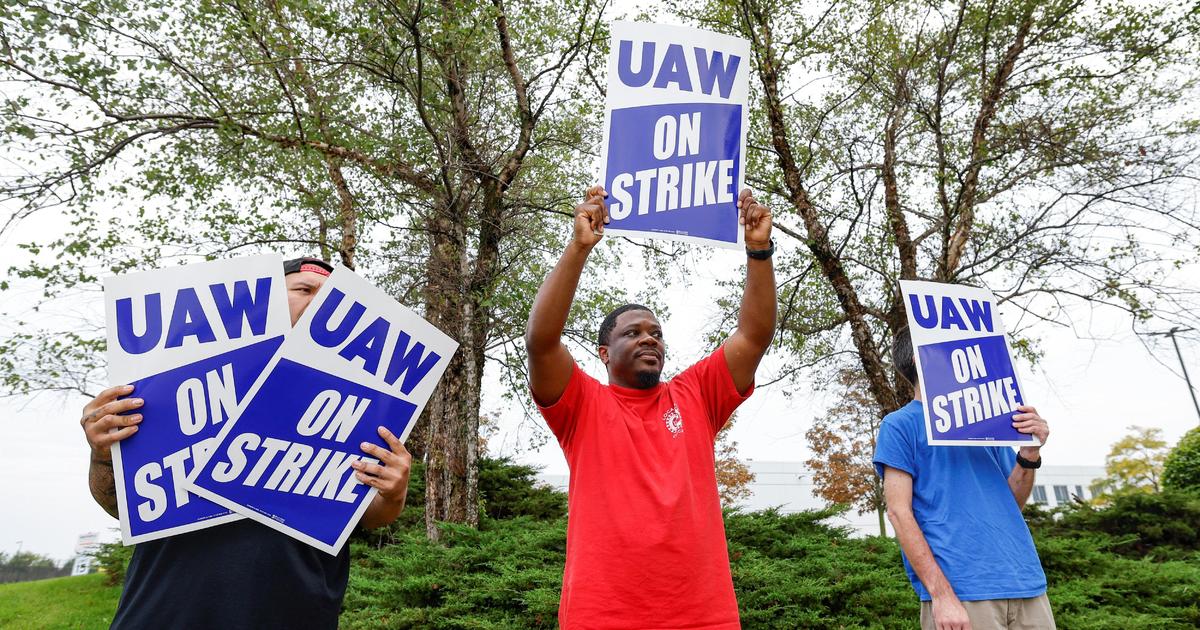United Auto Workers President Shawn Fain on Friday announced additional work stoppages as the union continues its historic strike against the Big Three carmakers, expanding the walkouts to a General Motors plant in Lansing, Michigan, and a Ford plant in Chicago.
Fain said in a live video broadcast on Facebook that union leaders are still negotiating with the automakers, but that “sadly, despite our willingness to bargain, Ford and GM have refused to make meaningful progress at the table.” He said 7,000 Ford and GM workers at the two facilities will leave their posts starting at noon.
That brings the total number of striking autoworkers to 25,000, or 17% of the UAW’s roughly 146,000 members.
Workers at the Chicago plant make the Chevrolet Traverse and Buick Enclave, while the Lansing facility manufactures the Ford Explorer and Lincoln Aviator. Fain said a Lansing metal parts stamping plant will remain open.
The UAW spared additional strikes at Stellantis. Fain said the parent company of Chrysler, Dodge, Jeep and Ram has made progress on negotiations, including in cost-of-living adjustments and giving workers the right to strike.
“We are excited about this momentum at Stellantis and hope it continues,” Fain said.
The Chicago and Lansing moves are part of the UAW’s “stand-up strike” — a rhetorical nod to the “sit-down” strike by GM workers in Flint, Michigan, in the 1930s.
The strike began on September 15 when nearly 13,000 autoworkers halted work at Big Three assembly plants Michigan, Missouri and Ohio. A week later, another 5,600 workers at 38 GM and Stellantis-owned parts distribution centers in 20 states walked off the job. The activity marks the first UAW strike since auto workers walked out on GM in 2019.
“We knew going into this, the fight wasn’t going to be quick,” Fain said. “I’m still very hopeful that we can reach a deal that reflects the incredible sacrifices and contributions that our members have made over the last decade.”
The UAW’s demands include a 36% pay increase across a four-year contract, annual cost-of-living adjustments, pension benefits for all employees, greater job security, restrictions on the use of temporary workers and a four-day work week. Along with a wage hike, the union also wants the automakers to eliminate a two-tiered wage system adopted at the companies after the 2008 financial crisis.
For their part, the automakers say they have made reasonable counteroffers, while arguing that the UAW’s wage and other demands would make it hard to compete with other car manufacturers.
Union leaders counter that the Big Three reaped hefty profits as car prices jumped during the pandemic, while workers failed to enjoy the same benefits.
The UAW striking in weekly waves allows the union to “inflict significant disruption while minimizing the number of workers not receiving paychecks,” Benjamin Salisbury, an analyst at Height Capital Markets, said in a report.
The Chicago and Lansing workers will now be paid through the UAW’s $825 million strike fund.
—With reporting from CBS News’ Kris Van Cleave and The Associated Press.

